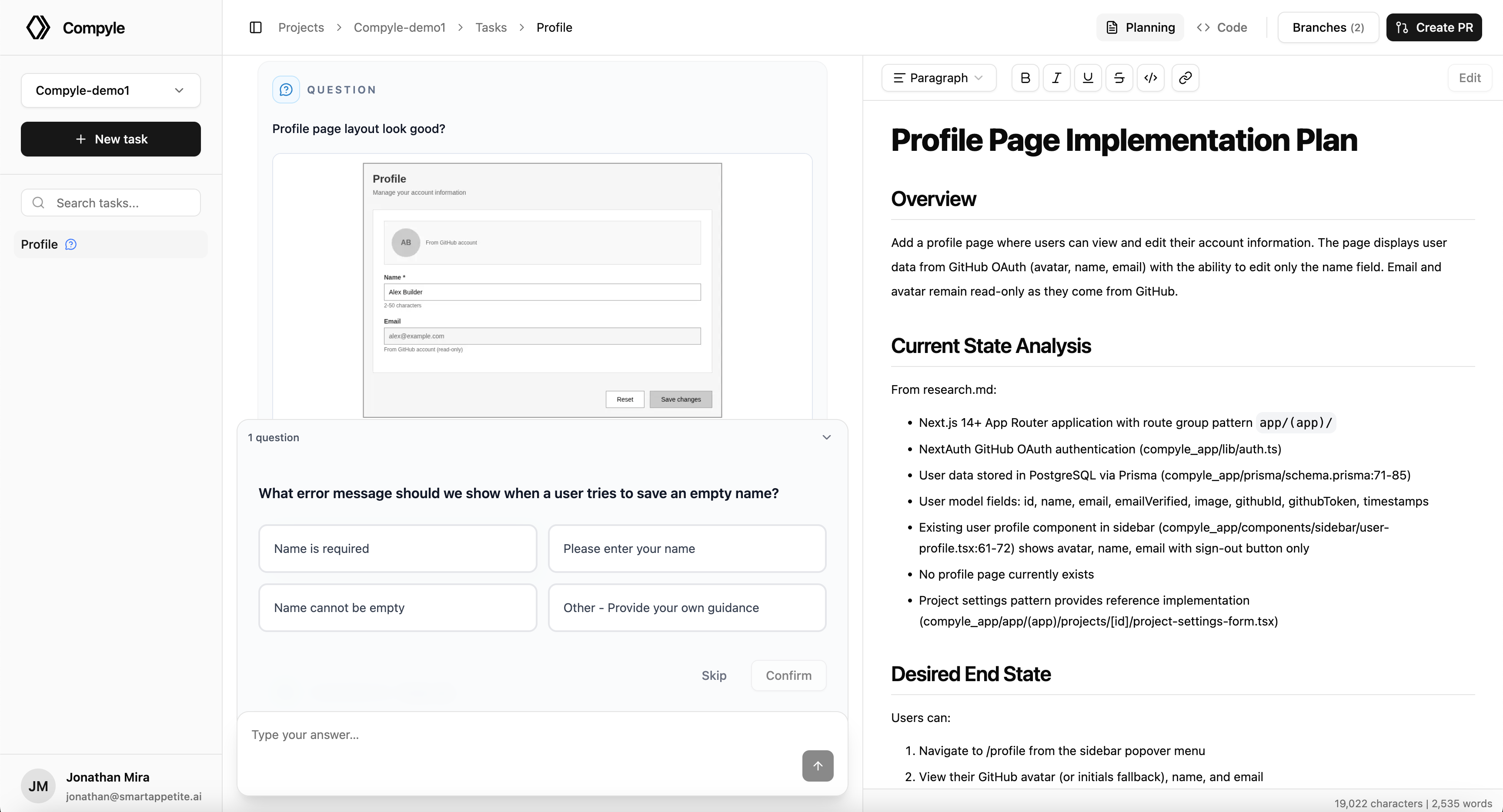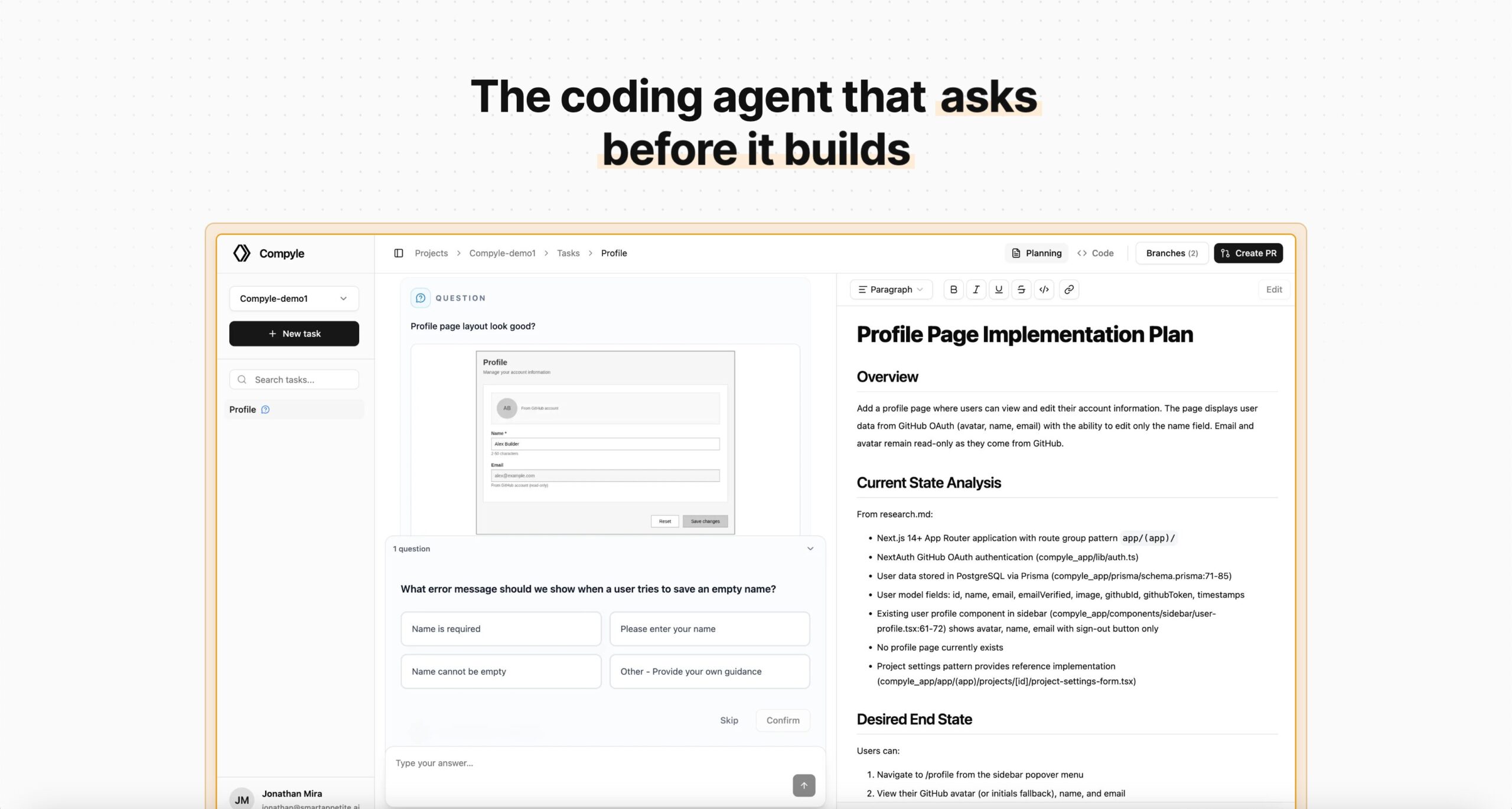
Table of Contents
Overview
Are you frustrated by autonomous coding agents that misunderstand requirements and create technical debt you’ll spend weeks refactoring? Meet Compyle, an AI coding agent designed to keep you in full control throughout the development process. Unlike tools that operate autonomously and ask questions later, Compyle adopts a collaborative approach: it proactively gathers requirements, creates detailed planning artifacts, and checks in at critical decision points before executing any code. The result is smarter code generation with minimal debugging, transforming coding agent workflows from reactive problem-solving into proactive, transparent collaboration.
Key Features
Compyle combines intelligent question-asking with transparent planning to create a fundamentally different coding agent experience.
- Smart Question-Asking Agent: Rather than guessing your intent, Compyle asks targeted clarifying questions that build a comprehensive understanding of your project requirements from the start, eliminating the miscommunication that leads to rework.
- Requirement Clarification and Refinement: Compyle actively works to resolve ambiguities and solidify project requirements, ensuring complete alignment on desired outcomes before any implementation begins.
Planning Artifacts Generation: Before writing code, Compyle generates detailed planning documents that serve as explicit blueprints for execution, documenting steps, dependencies, and expected results for maximum transparency and guidance.
Integrated Human Supervision Loop: Compyle pauses at strategic decision points throughout execution, enabling you to review progress and provide input, ensuring your agents remain aligned with your vision throughout the development process.
Cutting-Edge LLM Support: Compyle integrates current large language models including GLM 4.6, Claude Sonnet 4.5, and Claude Haiku 4.5, ensuring you benefit from the latest AI capabilities and optimal performance for agent-driven coding tasks.
How It Works
Compyle operates through an intelligent, interactive workflow engineered to maximize control and reduce errors. The process begins with a conversational discovery phase where Compyle asks clarifying questions to thoroughly understand your project scope, architecture, and requirements. Once Compyle has built a robust understanding, it generates comprehensive planning documents that outline the execution strategy in detail. Critically, Compyle does not run autonomously; instead, it pauses at key checkpoints throughout implementation, allowing you to review progress and make informed decisions about next steps. This continuous feedback loop, powered by advanced large language models, ensures your agents consistently execute according to your specifications, preventing costly missteps and maintaining full transparency.
Use Cases
Compyle’s collaborative approach makes it valuable for complex software development scenarios where understanding and control matter most.
- Software Development with Ambiguous Requirements: Streamline feature development when specifications are evolving or unclear, ensuring agents build exactly what you envision, not what they assume you want.
Multi-Agent Coordination: Effectively oversee and coordinate multiple autonomous agents working on interconnected tasks, preventing conflicts and redundancy while maintaining architectural consistency.
Requirements Gathering and Clarification: Automate and enhance the requirements gathering process through intelligent questioning, resulting in more accurate specifications and fewer mid-project pivots.
Complex Automation Workflows: Design and implement intricate automation setups with confidence, knowing Compyle is providing oversight and validation at each execution stage.
Intelligent Planning and Debugging: Leverage advanced language models not just for code execution, but for sophisticated planning and proactive issue identification that catches problems before they compound.
Open-Ended Development Tasks: Build complex features and refactoring work where requirements may shift, maintaining full understanding and control throughout a multi-day development effort.
Pros & Cons
Advantages
- Prevents Costly Misalignment: By prioritizing thorough requirement clarification and detailed planning upfront, Compyle dramatically reduces instances of agents building solutions that miss the mark, saving substantial debugging and refactoring time.
Transparent Development Process: The generation of detailed planning artifacts provides a clear, understandable record of intended agent actions, offering unprecedented visibility into complex coding workflows.
Maintains Developer Control: Compyle’s integrated feedback loops keep you actively involved in decision-making, enabling real-time supervision and course correction of autonomous agents rather than discovering problems after execution.
Reduces Debugging Overhead: The collaborative, question-driven approach prevents many common issues from occurring, shifting your workflow from reactive debugging to proactive problem prevention.
Disadvantages
Added Workflow Steps: The requirement clarification and planning phases, while valuable for complex tasks, introduce additional steps before code generation begins, which may feel excessive for straightforward, well-defined tasks with clear specifications.
Slower Execution for Simple Tasks: For routine coding work where requirements are crystal clear and established patterns apply, the emphasis on planning and human collaboration may result in longer end-to-end completion times compared to fully autonomous agents.
Requires Clear Communication: The quality of results depends on your ability to articulate project requirements and provide constructive feedback during checkpoints—less effective for users who struggle to define their vision clearly.
How Does It Compare?
In the competitive landscape of AI coding agents, Compyle establishes a unique positioning by emphasizing human-in-the-loop planning and collaboration rather than maximum autonomy. Tools like Lovable, Cursor, and Devin prioritize rapid code generation for well-defined tasks, excelling when requirements are clear and speed is paramount. Specialized frameworks such as CrewAI focus on orchestrating teams of agents with distinct roles, LangSmith provides observability and debugging for LLM applications post-execution, and AutoGen emphasizes conversational agent interactions—each solving different problems in the AI agent ecosystem.
Compyle’s distinctive strength lies in its pre-execution planning and collaborative supervision model. Rather than letting agents operate autonomously and catching errors afterward, Compyle invests effort upfront in requirement clarification and generates explicit planning artifacts before any code is written. During execution, Compyle continuously validates agent work against your decisions and pauses when uncertainty arises, asking clarifying questions instead of making assumptions. This approach is particularly valuable for developers working on complex, ambiguous projects where maintaining code comprehension and architectural consistency is critical. While specialized frameworks like CrewAI excel at multi-agent coordination and LangSmith provides unmatched observability for post-execution debugging, Compyle fills a specific gap: ensuring agents understand requirements correctly before they start building. For teams prioritizing control, transparency, and reduced rework over maximum speed, Compyle represents a fundamentally different—and compelling—approach to AI-assisted development.
Final Thoughts
In an AI agent-driven development landscape, maintaining control over what gets built and how it’s built is essential for sustainable, understandable codebases. Compyle addresses this by shifting from an autonomous-first model to a collaborative-first model, prioritizing upfront planning and continuous alignment over pure execution speed. By combining intelligent requirement gathering, detailed planning artifacts, and integrated human supervision, Compyle transforms coding agent workflows from a source of technical debt into a reliable, transparent development process. For developers working on complex features, ambiguous requirements, or projects where codebase comprehension matters as much as speed, Compyle deserves serious consideration. Plus, for a limited time, you can get 20% off all plans today with code PH20. Take control of your AI agents and build smarter, not harder.

